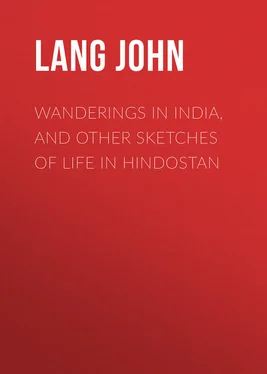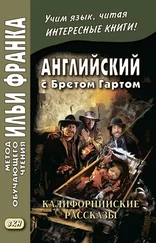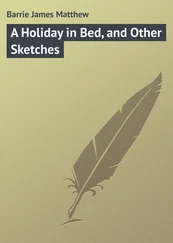John Lang - Wanderings in India, and Other Sketches of Life in Hindostan
Здесь есть возможность читать онлайн «John Lang - Wanderings in India, and Other Sketches of Life in Hindostan» — ознакомительный отрывок электронной книги совершенно бесплатно, а после прочтения отрывка купить полную версию. В некоторых случаях можно слушать аудио, скачать через торрент в формате fb2 и присутствует краткое содержание. Жанр: literature_19, foreign_antique, foreign_prose, Путешествия и география, на английском языке. Описание произведения, (предисловие) а так же отзывы посетителей доступны на портале библиотеки ЛибКат.
- Название:Wanderings in India, and Other Sketches of Life in Hindostan
- Автор:
- Жанр:
- Год:неизвестен
- ISBN:нет данных
- Рейтинг книги:3 / 5. Голосов: 1
-
Избранное:Добавить в избранное
- Отзывы:
-
Ваша оценка:
- 60
- 1
- 2
- 3
- 4
- 5
Wanderings in India, and Other Sketches of Life in Hindostan: краткое содержание, описание и аннотация
Предлагаем к чтению аннотацию, описание, краткое содержание или предисловие (зависит от того, что написал сам автор книги «Wanderings in India, and Other Sketches of Life in Hindostan»). Если вы не нашли необходимую информацию о книге — напишите в комментариях, мы постараемся отыскать её.
Wanderings in India, and Other Sketches of Life in Hindostan — читать онлайн ознакомительный отрывок
Ниже представлен текст книги, разбитый по страницам. Система сохранения места последней прочитанной страницы, позволяет с удобством читать онлайн бесплатно книгу «Wanderings in India, and Other Sketches of Life in Hindostan», без необходимости каждый раз заново искать на чём Вы остановились. Поставьте закладку, и сможете в любой момент перейти на страницу, на которой закончили чтение.
Интервал:
Закладка:
"Sahib," was the reply. After another brief delay, the door was opened by some unseen hand, and the native gentleman asked me to enter, informing me, at the same time, that he was about to leave me. A brief delay now occurred upon my part. It was with great difficulty that I could bring myself to take off my shoes. At length, however, I accomplished it, and entered the apartment in "stocking feet." In the centre of the room, which was richly carpeted, was an arm-chair of European manufacture, and around it were strewn garlands of flowers (Jhansi is famous for its beautiful and sweet-smelling flowers). At the end of the room was a purdah or curtain, and behind it people were talking. I sat myself down in the arm-chair, and instinctively took off my hat; but recollecting my resolve, I replaced it, and rather firmly – pulling it well down, so as completely to conceal my forehead. It was a foolish resolve, perhaps, on my part, for the hat kept the breeze of the punkah from cooling my temples.
I could hear female voices prevailing upon a child to "go to the Sahib," and could hear the child objecting to do so. Eventually, he was "launched" into the room; and upon my speaking kindly to the child, he approached me – but very timidly. His dress and the jewels on his person, satisfied me that the child was the adopted son of the late Rajah, and the rejected heir to the little throne of Jhansi. He was rather a pretty child, but very short for his years, and broad-shouldered – like most of the Mahratta children that I have seen.
Whilst I was speaking to the child, a shrill and discordant voice issued from behind the purdah, and I was informed that the boy was the Maharajah, who had just been despoiled of his rights by the Governor-General of India. I fancied that the voice was that of some very old woman – some slave or enthusiastic retainer, perhaps; but the child having imagined that he was spoken to, replied, "Maharanee!" and thus I was told the error of my conclusion.
And now the Ranee, having invited me to come closer to the purdah, began to pour forth her grievances; and, whenever she paused, the women by whom she was surrounded, set up a sort of chorus – a series of melancholy ejaculations – such as "Woe is me!" "What oppression!" It reminded me somewhat of a scene in a Greek tragedy – comical as was the situation.
I had heard from the vakeel that the Ranee was a very handsome woman, of about six or seven and twenty years of age, and I was very curious indeed to get a glimpse of her; and whether it was by accident, or by design on the Ranee's part, I know not, my curiosity was gratified. The curtain was drawn aside by the little boy, and I had a good view of the lady. It was only for a moment, it is true; still I saw her sufficiently to be able to describe her. She was a woman of about the middle size – rather stout, but not too stout. Her face must have been very handsome when she was younger, and even now it had many charms – though, according to my idea of beauty, it was too round. The expression also was very good, and very intelligent. The eyes were particularly fine, and the nose very delicately shaped. She was not very fair, though she was far from black. She had no ornaments, strange to say, upon her person, except a pair of gold ear-rings. Her dress was a plain white muslin, so fine in texture, and drawn about her in such a way, and so tightly, that the outline of her figure was plainly discernible – and a remarkably fine figure she had. What spoilt her was her voice, which was something between a whine and a croak. When the purdah was drawn aside, she was, or affected to be, very much annoyed; but presently she laughed, and good-humouredly expressed a hope that a sight of her had not lessened my sympathy with her sufferings nor prejudiced her cause.
"On the contrary," I replied, "if the Governor-General could only be as fortunate as I have been, and for even so brief a while, I feel quite sure that he would at once give Jhansi back again to be ruled over by its beautiful Queen."
She repaid this compliment, and the next ten minutes were devoted to an interchange of such matters. I told her that the whole world resounded with the praises of her beauty and the greatness of her intellect; and she told me that there was not a corner of the earth in which prayers for my welfare remained unsaid.
We then returned to the point – her "case." I informed her that the Governor-General had no power to restore the country, and recognise the claim of the adopted son, without a reference to England, and that the most prudent course for her to adopt would be to petition the throne, and meanwhile draw the pension of 6000 l. a year, under protest that it was not to prejudice the right of the adopted son. At first she refused to do this, and rather energetically exclaimed: "Mera Jhansi nahin dengee" (I will not give up my Jhansi). I then pointed out to her, as delicately as possible, how futile would be any opposition; and told her, what was the truth, that a wing of a native regiment and some artillery were within three marches of the palace; and I further impressed upon her that the slightest opposition to its advance would destroy her every hope, and, in short, jeopardize her liberty. I did this because she gave me to understand – and so did her attorney (and my impression is that they spoke the truth) – that the people of Jhansi did not wish to be handed over to the East India Company's rule.
It was past two o'clock that night before I left the palace; and ere I took my departure, I had talked the lady into my way of thinking, except that she would not consent to draw any pension from the British Government.
On the following day I returned to Gwalior, en route to Agra. The Ranee presented me with an elephant, a camel, an Arab, a pair of greyhounds of great swiftness, a quantity of silks and stuffs (the production of Jhansi), and a pair of Indian shawls. I accepted these things with great reluctance, but the financial minister entreated me to take them, insomuch as it would wound the Ranee's feelings if I refused. The Ranee also presented me with a portrait of herself, taken by a native, a Hindoo.
The state of Jhansi was not restored to the rule of the Ranee, and we know that she afterwards rivalled that fiend Nena Sahib, whose "grievance" was identical with her own. The Government would not recognise Nena Sahib as the adopted son and heir of the Peishwah; the Ranee of Jhansi sought to be recognised as the Regent during the minority of the late Rajah's adopted son and heir.
TIRHOOT, LUCKNOW, BHITOOR, ETC
It is some years since I first landed in Calcutta. I was in no way connected with the Government, and was consequently an "interloper" or "adventurer." These were the terms applied by certain officials to European merchants, indigo-planters, shopkeepers, artisans, barristers, attorneys, and others.
It was not long before I made up my mind to become a wanderer in the East. I had no occupation, was my own master, and had a large tract of country to roam about in. My first step was to acquire a knowledge of Hindostanee and of Persian. By dint of hard study, at the end of six months I found myself capable, not only of holding a conversation, but of arguing a point in either of these languages: and with a light heart I took my departure from the City of Palaces, and proceeded to Monghyr, on the Ganges.
The chief civilian of that district had invited me to spend a month with him. Every day I accompanied my friend to his court, and thereby got some insight into the administration of justice in India, both civil and criminal. Here, too, I first made acquaintance with Thugs. Several most notorious characters of that tribe were at Monghyr – not imprisoned, but permitted to move about. They had been pardoned on condition that they would become informers, and, to a certain extent, detectives, in the suppression of Thuggee in the British dominions. It was a curious feeling to be in conversation with men who had each committed his ninety or a hundred murders – to see the fingers that had strangled so many victims – to watch the process, for they were good-natured enough to act it. There was the unsuspecting traveller with his bundle; the decoy Thug, who engaged him in conversation; the two men, who, at the given signal, were to seize; the executioner, standing behind with the handkerchief, ready to strangle the victim. They even went through the operation of searching the "deceased," upon whom they found nothing in this case; but they assured me this frequently happened in reality. The reader is of course aware that it is a part of the Thug's religion not to rob a live body. The crime of murder must precede that of theft. The play – the tragedy – over (to these domesticated demons it was a mere farce), they laughed at the solemn expression which, I doubt not, was stamped upon my features.
Читать дальшеИнтервал:
Закладка:
Похожие книги на «Wanderings in India, and Other Sketches of Life in Hindostan»
Представляем Вашему вниманию похожие книги на «Wanderings in India, and Other Sketches of Life in Hindostan» списком для выбора. Мы отобрали схожую по названию и смыслу литературу в надежде предоставить читателям больше вариантов отыскать новые, интересные, ещё непрочитанные произведения.
Обсуждение, отзывы о книге «Wanderings in India, and Other Sketches of Life in Hindostan» и просто собственные мнения читателей. Оставьте ваши комментарии, напишите, что Вы думаете о произведении, его смысле или главных героях. Укажите что конкретно понравилось, а что нет, и почему Вы так считаете.












